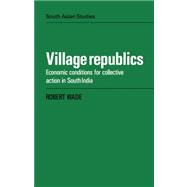
Note: Supplemental materials are not guaranteed with Rental or Used book purchases.
Purchase Benefits
What is included with this book?
| List of illustrations | |
| List of tables | |
| Preface | |
| The village as a corporate group | |
| The circumstances of village organization | |
| Kottapalle | |
| The social response to open-field husbandry | |
| The social response to irrigation | |
| The range of council activities | |
| The mode of public choice | |
| Variation between villages (1): social structure | |
| Variation between villages (2): ecology and risk | |
| Conclusions (1): the conditions for collective action | |
| Conclusions (2): theories of collective action | |
| Appendix: water supply and irrigation network | |
| Bibliography | |
| Index | |
| Table of Contents provided by Publisher. All Rights Reserved. |
The New copy of this book will include any supplemental materials advertised. Please check the title of the book to determine if it should include any access cards, study guides, lab manuals, CDs, etc.
The Used, Rental and eBook copies of this book are not guaranteed to include any supplemental materials. Typically, only the book itself is included. This is true even if the title states it includes any access cards, study guides, lab manuals, CDs, etc.